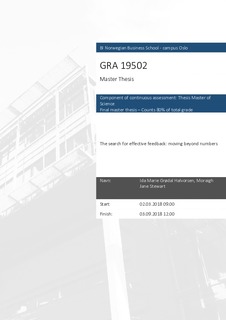The search for effective feedback: moving beyond numbers
Master thesis

Permanent lenke
http://hdl.handle.net/11250/2579812Utgivelsesdato
2018Metadata
Vis full innførselSamlinger
- Master of Science [1621]
Sammendrag
The purpose of this exploratory study was to move towards filling a gap in
literature about effective feedback, specifically, how it is defined and what
elements contribute to how the giver and receiver of feedback perceives
effectiveness of feedback. Organisations generally accept that feedback is an
important part of workplace behaviour and as such feedback has attracted a great
deal of attention from researchers. Unfortunately, research is largely inconclusive
and ambiguous as to what exactly defines effective feedback. It is also uncertain
whether or not academia’s impression of effective feedback is congruent with
employee perceptions, and how this agrees with current organisational practices.
Due to these uncertainties, as well as the predominance of quantitative studies on
feedback, the authors opted for an exploratory research design taking the form of
semi-structured interviews with both feedback givers and receivers at
organisations in Norway. Our findings were varied and address several
dimensions of the feedback process, and the authors present seven of their nine
emerging themes in an integrated model which possibly will contribute to
understanding the complexity of giving and receiving feedback. From this, it
appears that feedback and its effectiveness cannot be isolated from its context and
the people involved, which accounts for at least some of the inconsistencies in
research, as well as the difficulties in establishing one universal definition. At its
core, perceptions of effective feedback are subjective and dependent on several
factors, which make generalisations elusive. However, some trends and themes
were identified, and these illustrate important key points about feedback that can
be useful to practitioners and scholars alike. Moreover, the current research
demonstrates that employees are passionate about and desire high quality
feedback, which emphasizes the value of examining feedback in a continuously
evolving society.
Beskrivelse
Masteroppgave(MSc) in Master of Science in Leadership and Organizational Psychology - Handelshøyskolen BI, 2018